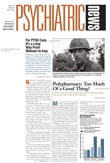Where can I find CME courses on ethics topics? How do we get materials for National Depression Screening Day? Can I give confidential information about a recently deceased patient to her child? Is it ethical for me to treat a member of my own family? How can I get emergency funds for my district branch?
These are the types of questions APA’s Office of Ethics and District Branch/State Association (DB/SA) Relations receives daily. The office fosters closer working relationships with members and the executive staff of district branches and state associations by serving as an information clearinghouse and referral service on a range of organizational issues, benefits, and problem resolution.
At the end of 2002, with the retirement of long-time director of the Office of Ethics and Professional Responsibility, Carol Davis, and with the resignation of Pat Rye, the director of the Office of District Branch/State Association Relations, APA decided to merge these two offices into one. In January 2003, Linda Hughes moved from the Division of Government Relations to become director of the Office of Ethics and District Branch/State Association Relations. A program manager was recently hired. This two-person office has an annual budget of $188,000.
In addition to responding to calls from APA members and the general public about APA’s Principles of Medical Ethics With Annotations Especially Applicable to Psychiatry, the office is a resource to the district branches and its ethics committees as they enforce APA’s “Procedures for Handling Complaints of Unethical Conduct.” These procedures were amended by the Board of Trustees in late 2002, and the office has been instrumental in working with the APA Ethics Committee to educate the district branches and general members about the changes that permit district branches to choose between approaches: the traditional enforcement option and a new, educational option. There have been component workshops at the annual meeting, a 1.5-day educational ethics workshop for DB ethics chairs, as well as the Ethics Committee’s annual meeting luncheon for DB ethics chairs and DB/SA executive staff.
The office also serves as a focal point and information conduit for issues related to the DBs/SAs and advocates for their primary and special interests within the APA central office.
Two list serves—one for DB presidents and presidents-elect and one for DB/SA executive staff—expedite information flow and foster communication and sharing of information. The office conducts a yearly orientation for incoming presidents and presidents-elect, which updates DB executive staff and prepares DB presidents-elect for their term by becoming more knowledgeable about APA, its organization, governance, philosophy, legislative agenda, and services. The session also provides a networking opportunity with other presidents-elect to explore goals, priorities, opportunities, and challenges.
Twice a year, APA provides an opportunity for DB/SA executive staff to meet and network, share information on “best practices,” receive updates on APA programs and activities, and provide input into activities such as membership, recruitment and retention, information systems, government relations, and education.
In November APA will host a leadership conference for the DB/SA executive staff. Attendees will learn the dynamics of effective leadership and organization including policymaking, strategic planning, goal setting and measurement, volunteer recruitment, retention, and accountability and issue management strategies. Additionally, they will enhance their skills in team building, parliamentary procedures, and effective member-staff cooperation.
Working closely with other APA departments and components, the office coordinates programs and projects that benefit the DBs/SAs.
APA has developed a section on its Web site devoted to the DB staff called the Extranet. This site contains administrative information, including the APA Operations Manual, model bylaws, information on APA awards, and so on. Staff is working to expand the information found on this site to include such items as information on best practices and newsletter articles that could be shared with other DBs.
Member service is our priority! The office continues to look for ways to improve our service to our members and to strengthen our partnership with our district branches and state associations—we welcome your input! Please forward your comments and suggestions to me at
[email protected]. ▪

